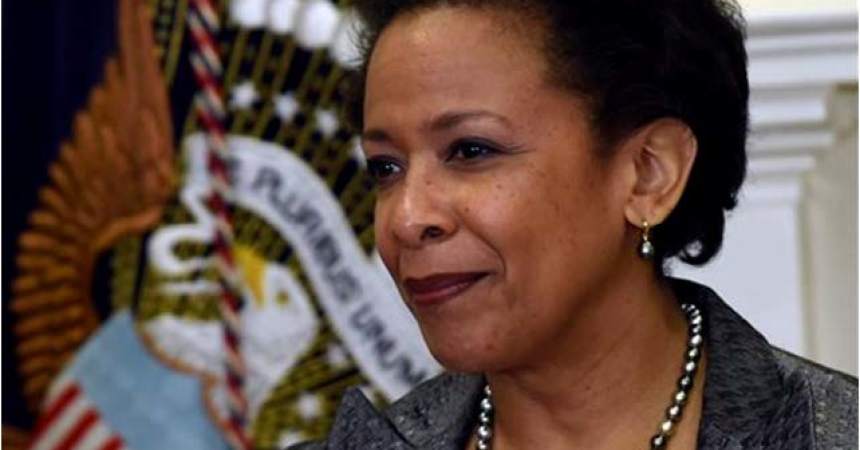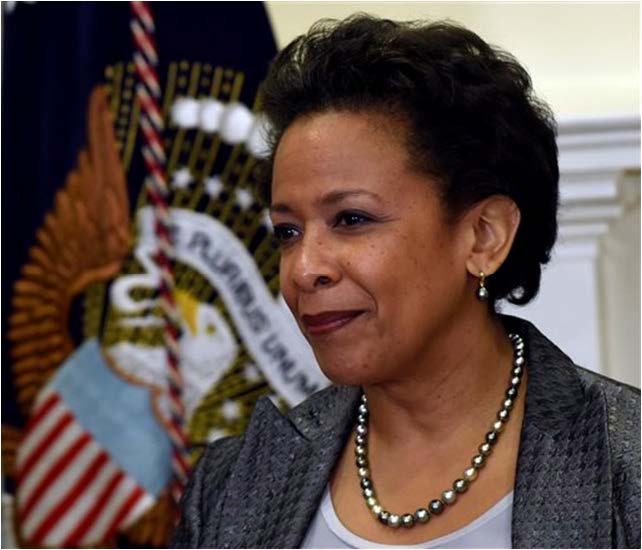
Loretta Lynch Confirmed by Senate as Attorney General

Photo courtesy of AP Photo/Susan Walsh U.S. Attorney Loretta Lynch is seen in the Roosevelt Room of the White House in Washington, D.C. on Nov. 8, 2014 after President Barack Obama nominated her to be the next Attorney General succeeding Eric Holder.
By Mike DeBonis
Loretta E. Lynch’s long wait to become U.S. attorney general ended April 23, with the Senate voting to confirm the veteran New York prosecutor’s nomination five months after President Obama submitted it to Congress.
Ten Republicans joined the Senate’s 44 Democrats and two independents in supporting Lynch’s confirmation, a margin slightly wider than expected ahead of the vote. But getting the Senate to this point has been a slow and rancorous affair, one Obama deemed “embarrassing” last week.
“I guess I was naive in thinking my Republican colleagues would treat Loretta Lynch with the dignity that she and her office deserve,” Minority Leader Harry M. Reid (D-Nev.) said on the Senate floor. “Perhaps my mistake was forgetting that for Republicans, this isn’t about Loretta Lynch. It’s about President Obama.”
Obama nominated Lynch, 55, to replace Eric H. Holder Jr. in November. The Senate, then under Democratic control, did not act on the nomination, preferring to spend precious time in the lame-duck session on judicial appointments that party leaders believed would stall in a Republican-controlled Senate.
But Lynch’s nomination stirred plenty of controversy, especially after she became entangled in a deep partisan rift over immigration policy. During questioning before the Senate Judiciary Committee in late January, Lynch said she believed Obama’s executive actions on immigration last year passed legal and constitutional muster — angering Republicans who considered them an overreach.
“Ms. Lynch has said flat-out that she supports those policies and is committed to defending them in court,” Sen. Jeff Sessions (R-Ala.) said. “So I think Congress has a real role here. We do not have to confirm someone to the highest law enforcement position in America if that someone is publicly committed to denigrating Congress.”
Sen. Ted Cruz (R-Tex.) said that, under Lynch, “We are sadly going to see more and more lawlessness, more recklessness, more abuse of power, more executive lawlessness.”
Cruz spoke against Lynch on the Senate floor but was the only senator not to attend the final vote.
It took nearly a month for the panel to advance Lynch’s nomination, and once it did, the nomination soon was caught up in an unrelated political dispute.
An otherwise noncontroversial bill to combat sex trafficking became stuck on the Senate floor after pro-abortion-rights Democrats objected to provisions that would extend existing federal restrictions on abortion funding to a new victims’ compensation fund. At that point, Majority Leader Mitch McConnell (R-Ky.) tried to force Democrats to accept the language by tying Lynch’s nomination to the anti-trafficking bill’s passage.
The move incensed Democrats, some of whom spoke in racial terms about what they saw as shabby treatment of the first African American woman to be named attorney general. Minority Whip Richard J. Durbin (D-Ill.), for instance, said Lynch was “asked to sit in the back of the bus” by Republicans, a reference to civil-rights icon Rosa Parks.
Sen. Claire McCaskill (D-Mo.) called the Republican opposition “disgusting” and “base politics at its ugliest.”
“It doesn’t matter if you’re qualified,” she said. “That makes no difference. We have a new test: You must disagree with the president that nominated you. . . . This defies common sense.”
Obama did not blame Lynch’s race for the delay, but he showed exasperation regardless. “It’s gone too far,” he said last week. “Enough. Enough. Call Loretta Lynch for a vote. Get her confirmed. Put her in place. Let her do her job.”
The deadlock broke Monday when party leaders agreed to restrict the victims’ fund to non-medical purposes, making trafficking victims instead eligible for health care under an existing federal program already subject to abortion restrictions.
The anti-trafficking bill passed Wednesday afternoon on a 99-to-0 vote.
Twenty Republicans supported a procedural move to close debate and proceed to Lynch’s confirmation. But only half of them voted to confirm her in the final vote: Kelly Ayotte (N.H.), Thad Cochran (Miss.), Susan Collins (Maine), Jeff Flake (Ariz.), Lindsey O. Graham (S.C.), Orrin G. Hatch (Utah), Ron Johnson (Wis.), Mark Kirk (Ill.) and Rob Portman (Ohio). McConnell joined them after expressing reservations in the weeks leading up to the vote.
Ayotte, Johnson, Kirk and Portman face reelection battles next year in states that voted for Obama in the 2012 presidential race.
Only five Republicans had publicly vowed to support Lynch before her April 23 vote, though that support could grow modestly in the final vote. Ayotte announced she would vote to confirm, saying in a statement that Lynch is “clearly qualified and has the necessary experience to serve as Attorney General.” She said she had “written assurance” from Lynch that she would abide by court rulings on the immigration orders.







